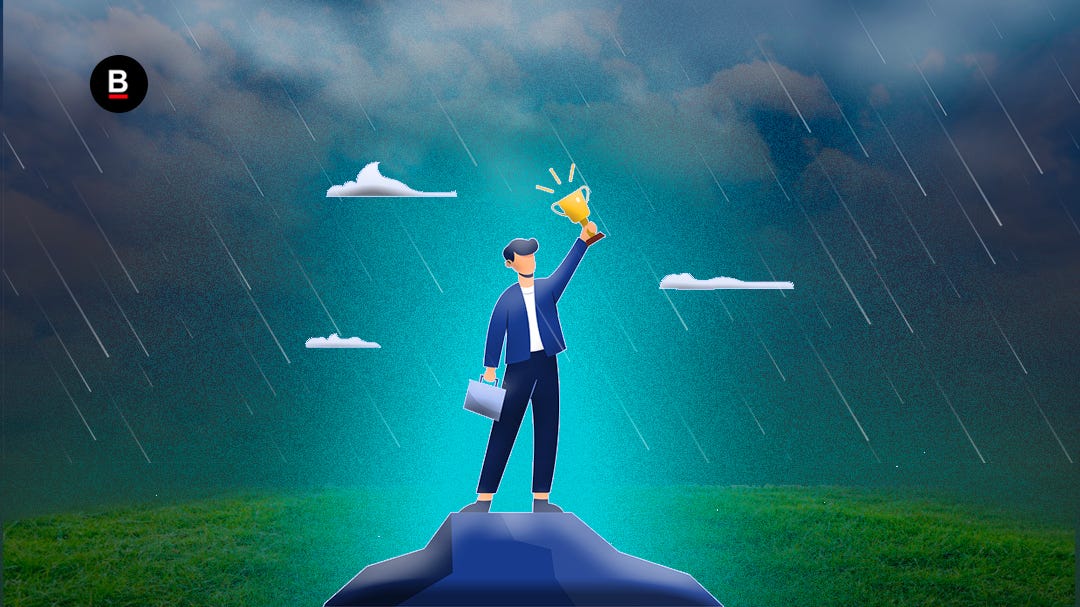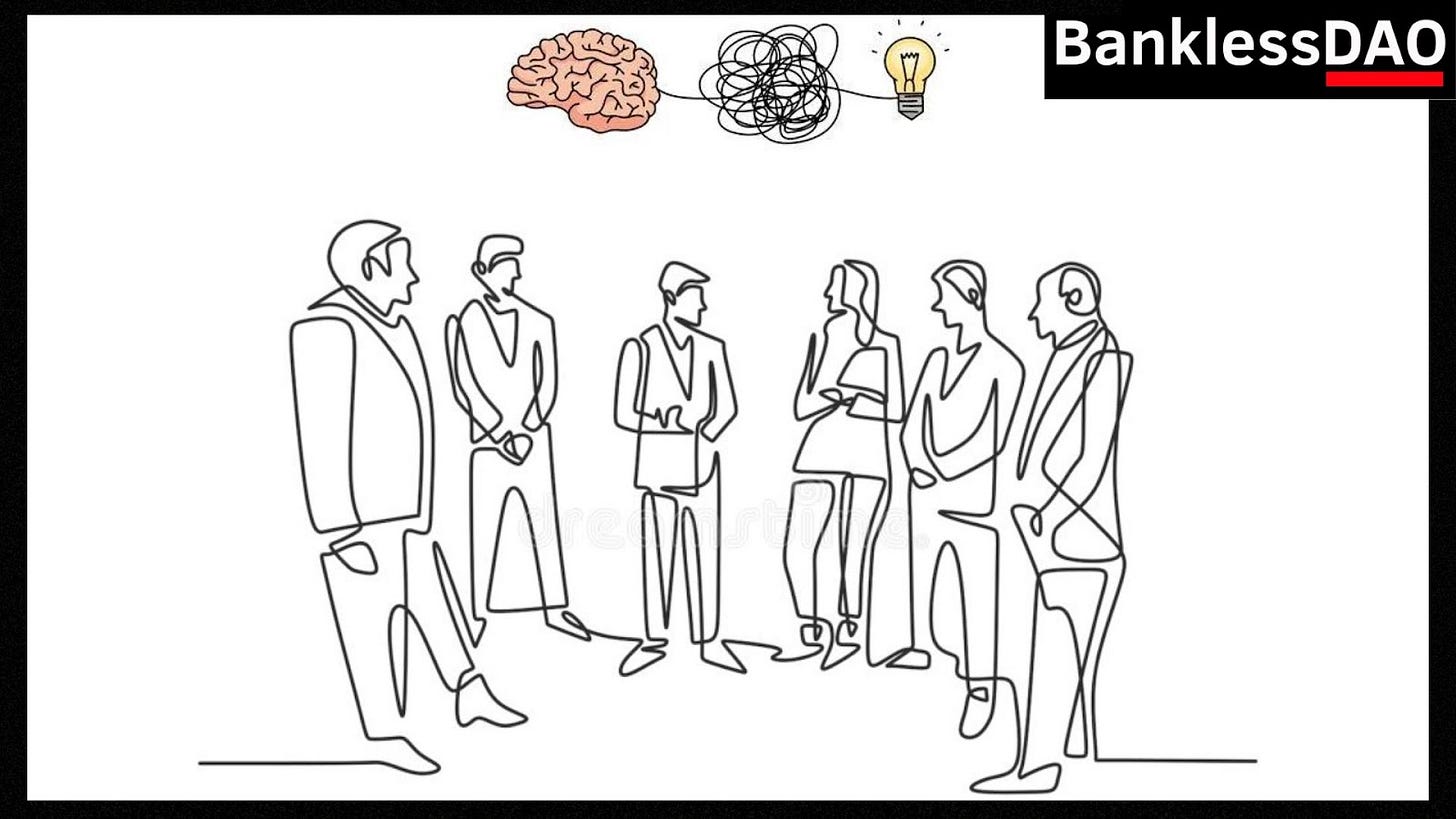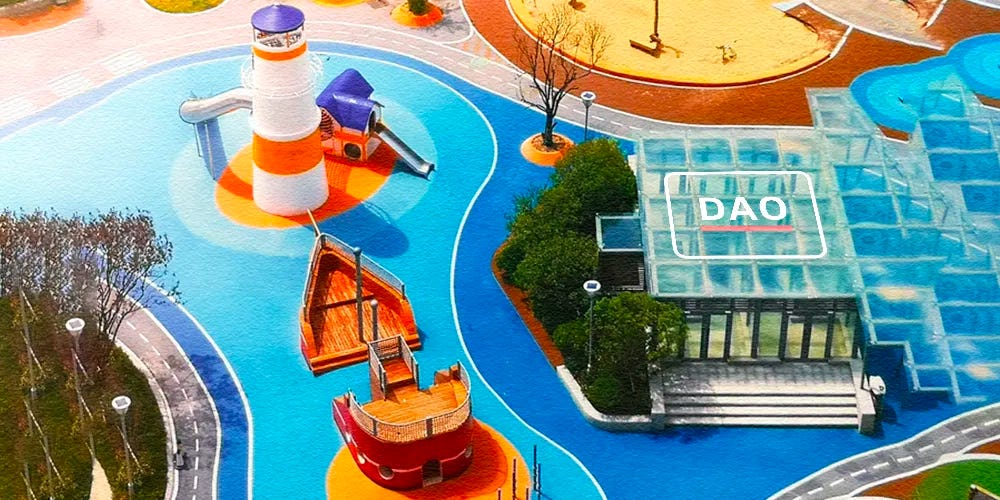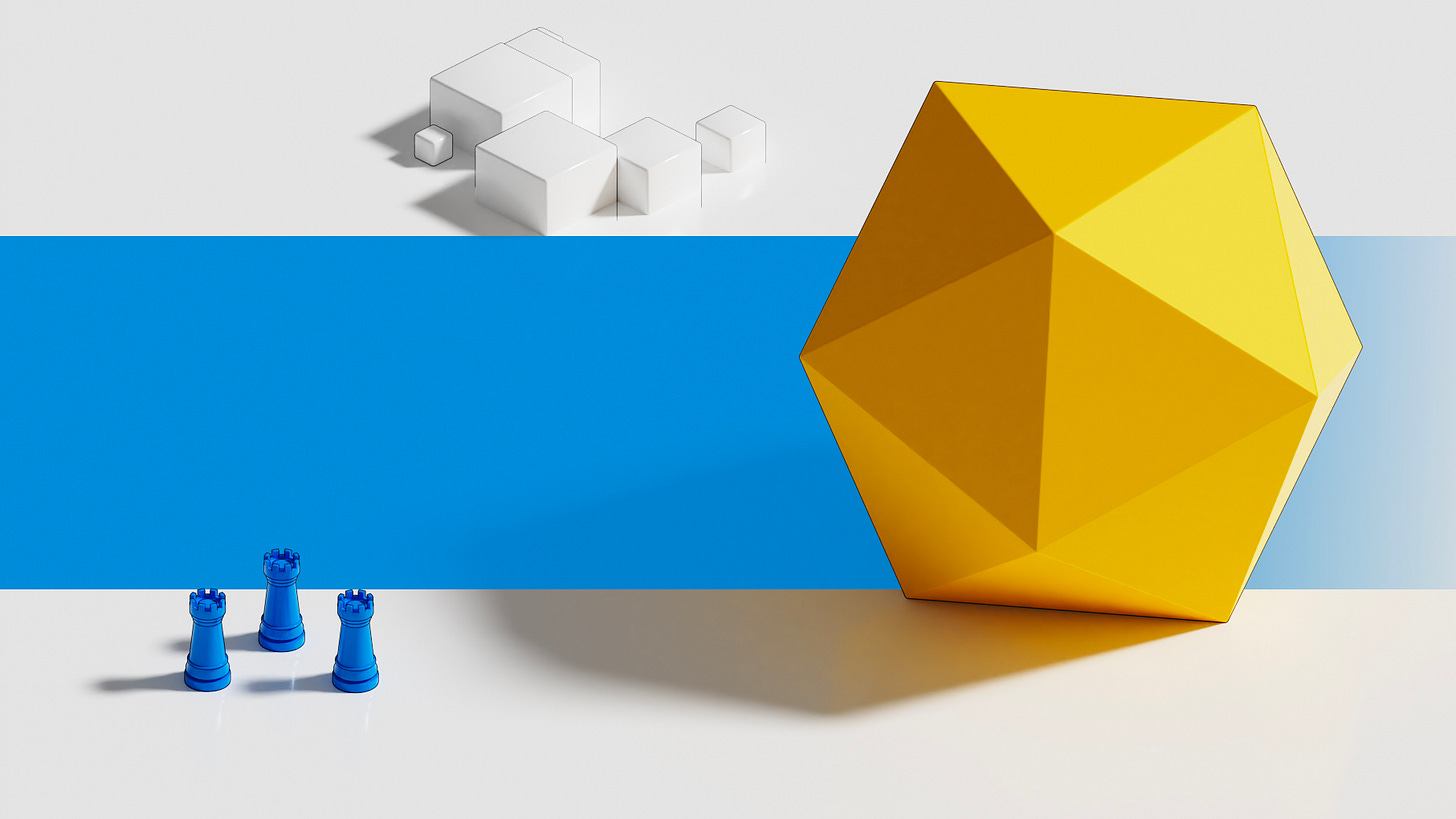7 Essential DAO Skills | State of the DAOs
You're reading State of the DAOs, the high-signal low-noise newsletter for understanding DAOs.
gm and welcome to State of the DAOs!
At BanklessDAO we believe that DAOs are the future of work. These decentralized, global communities give you an opportunity to explore your freedom with purpose and intention, charting your professional life as you see fit.
But working in DAOs is not easy, it can be downright scary in this type of market.
This week, Kaf shows us the essential skills we need to thrive in this environment. Having spent the past year working in DAOs, he shares the lessons he has learned along the way. As explorers, builders, and dreamers, these are the skills you need to succeed.
Next, we feature an interview by the ImpactDAO study with Marco Barbosa, the founder of impactMarket. impactMarket is a platform for crowd-sourcing funds for those in need. As the world’s largest decentralized UBI program they have demonstrated that giving money directly to people in need is more impactful that central entities allocating it as they see fit. Marco describes how he thinks web3 is uniquely positioned to improve aid distribution, and how DAOs have the potential to give people the tools they need to prosper.
Finally, we share the TL;DR on some of the best DAO ecosystem takes and thought pieces, making it easy for you to cut through the noise and learn everything you need to know about the current state of the DAOs.
Contributors: BanklessDAO Writers Guild (KAF, Seneca52, angelspeaks, Teafeh, Warrior, HiroKennelly, siddhearta)
This is the official newsletter of BanklessDAO. To unsubscribe, edit your settings.
7 Essential DAO Skills
Author: KAF
One year ago, I wrote about how DAOs are going to change everything. Since then I went down the rabbit hole, learning the essential skills every DAO member needs to be successful in this new organizational environment.
DAOs enable the decentralized management of work, from hiring to project management. In traditional companies, if you wanted to get a job you had to contact them, send them a resume, and wait for the person in charge of human resources to agree to have an interview with you. DAOs couldn’t be more different.
In DAOs you just have to enter their Discord and introduce yourself. According to your skills and the time you have to give, the community will guide you and help you find a great fit. As you start contributing and as the community gets to know and trust you, your reputation will increase and the more opportunities will come your way.
In this article, I explain some of the skills that will make you a trusted contributor:
Basic knowledge of blockchain
Fast learning
Communication
Time Management
Problem-Solving
Teamwork
Autonomy
Basic Knowledge of Blockchain
DAOs are organizations that base their operation on the blockchain. You will not be able to understand the power that DAOs have if you do not first understand the basics of blockchain.
My advice for acquiring this skill is to practice. Like everyone else, I started out by buying crypto on a centralized exchange. As I learned, I ventured into new territory, learning about the blockchain as I went.
Today, for example, I can set up a joint treasury using Ethereum scaling solutions and implement an automated payment system within a DAO. Sound Chinese to you? That’s as it should be. No one is born knowing everything. There are plenty of free resources to start learning about blockchain, so dig in and start learning.
Learn Often and Fast
Now that you have some basic blockchain knowledge, you need to get ready to learn, often and fast. Learn by doing. If one day you send money to the wrong wallet, you will learn that there’s no solution. Treat mistakes as lessons. Sometimes you win and sometimes you learn.
We are early and if you are equipped with basic knowledge of blockchain tech, you are already ahead of 99% of people. But you can’t relax. The ecosystem is constantly changing. Learning must be continuous.
If you are not learning something new every day, you will fall behind. Make a point to learn something new today.
Communication
Communication is vital in almost all aspects of life. But in web3, this skill is critical.
The way we communicate has changed in recent years. Remote work is becoming more and more normal and virtual meetings are the order of the day. The good? Independence. The bad? Isolation.
Coffee time is very beneficial in traditional jobs. Being able to talk face-to-face with your colleagues about the day helps you focus and keeps your energy up.
DAOs are different. Coordinating with people from different cultures and in different time zones is not an easy task. If you can communicate effectively you will have a great advantage.
Most DAOs have weekly meetings where members catch up and plan work. The rest of the work is discussed on Discord. Practice both your live communication and your async written communication. Clear thinking and writing is key.
Time Management
The freedom offered by DAOs has its advantages and disadvantages. In DAOs, there are no schedules. That’s why you must learn to manage your time.
As DAOs work through meritocracy, whoever is capable of solving the problems or doing the tasks that are required will be the one who gets the reward. Nobody is going to be behind you telling you what to do. But you can’t do the work if you don’t manage your time.
Learning to manage it better will pay off in the long run.
Problem-Solving
An old boss I had always said. “I don’t want problems, I want solutions.”
There’s still much to do in DAOs — We're paving the way, learning as we go. It may be that more than 50% of the current DAOs will disappear due to operational inefficiency, to problems that arise but remain unaddressed. Contributors are responsible for resolving issues that arise, and without focused problem solving, a DAO will fail.
Decentralized governance is difficult to implement. Coordination is sometimes ineffective. Technical problems appear when you least expect them. The market doesn’t always go up. All these obstacles need to be resolved as they appear. That’s why a contributor who is decisive and a problem solver will be successful in any DAO.
Teamwork
The ability to work in a team will help you be a good contributor. DAOs are often divided into subDAOs or guilds. A DAO is like a corporation and the guilds are like the departments.
If you want to be a good contributor, you have to be a team player. Perform your tasks and coordinate with the rest of the team. Provide value whenever your colleagues need you. In DAOs no one is better than anyone and we all must work together to achieve the DAOs mission.
As we’ve said before, problems will arise. A decisive team in which its members communicate well can make a difference.
Autonomy
In a DAO you must be autonomous but biased towards action. What do I mean? You must be proactive and able to work on your own. You have to be able to identify the weaknesses of the DAO and have initiatives that add value.
To be a good contributor, you must work as a team. And to work in a team you must be able to work autonomously. At least in the DAO.
I’ve realized that not everyone is designed to be a DAO contributor. Many people prefer to just take orders. There is nothing wrong with that. DAOs need leaders as well as followers. But to really excel in DAOs, you also must learn how to move alone and blaze a trail.
Take These Tips and Thrive
The essential skills listed above will help you succeed within a DAO. They are not the only ones, but with these skills, you can continue to develop and grow on your own web3 journey.
DAOs are a new way of organizing towards a common purpose, replete with new technology, and they are constantly evolving.
The sooner you dive in, join a DAO, and learn how web3 and blockchain will change the way we work, the sooner you can join this revolution.
KAF is a consultant and writer helping people get closer to NFTs, DAOs, DeFi, and the metaverse.
Actions steps
📖 Read DAOing it Fulltime: Tips Gathered Around the Office | Weekly Rollup
⛏️ Dig into Finding Freedom and Agency in DAOs | State of the DAOs
🎧 Listen Improving Mental Fitness, Avoiding Burnout, and Getting More Out of Web3 & DAOs | Louis from twoplus
Impact DAO Study
Impact DAOs Research + Book project is a decentralized, collaborative and open source project. The goal of the project is to publish a book on Impact DAOs that provides information, wisdom, and insights for new web3 entrants. The project covered ten DAOs in total, conducting three in-depth conversations per DAO. To learn more about the project visit the Gitcoin grant page. If you’d like to follow their work they’ll be regularly sharing their learnings and DAO builder interviews on ImpactDAO Media. You can also follow the hashtag @ImpactDAOs on Twitter.
Beyond UBI: How Web3 Fixes Global Poverty
Author: Seneca52
Marco Barbosa is the founder of impactMarket, the world’s largest decentralized UBI program.
We spent some time learning from him about the insights he’s gained on how web3 is uniquely positioned to switch up the game in aid distribution, and how UBI is only one of many tools for true financial empowerment, albeit an important initial enabler.
As usual, there was too much good stuff to fit into the slender confines of this weekly post. For the full interview, you should check out the blog post.
How impactMarket works
impactMarket is a continually expanding ecosystem, but at its core, it is a platform for crowd-sourcing funds for those in need. Its token of choice is the stablecoin cUSD, issued on the Celo blockchain.
impactMarket has developed the Libera Crypto Wallet, which functions both as a wallet and an app, meaning that beneficiaries and donors have a one-stop shop for all their activities.
Donors who contribute cUSD can receive the $PACT governance token as a reward, and can donate to specific communities via the app. $PACT tokens can also be staked for additional rewards (“Impact Farming”), and of course, all holders can influence the direction of the DAO.
Beneficiaries - recipients of the funds - can use them to directly purchase items from merchants who accept the token. No need to redeem or exchange.
Contrary to common perception, communities on the receiving end of aid are not befuddled by the concept of seed phrases. “People know each other and help each other,” Marco says, “The young are there to help out the old. And it’s quite easy to explain”.


Why web3 is key
In an age of creeping existential doubt about whether web3 has a viable use case beyond facilitating a gigantic, collective acid trip funded by ponzinomics and hot air - Marco reminds us that emerging markets are a perfect use case for blockchain-based fund distribution system.
“The same code works in any region. It’s beautiful. You don’t need to set up a subsidiary or a local bank account,” he says. “People think scalability is about the number of transactions. But a lot of people are constrained by the lack of a bank account and other logistics.” Whereas traditional fund distribution to distressed areas of the globe requires the use of costly intermediaries and on-the-ground auditors, the blockchain clears away such barriers.
Furthermore, with smart contracts at the core, the human aspect of the DAO, while important, is not necessary for its core utility to continue. The low overheads that result from higher efficiency create a leverage effect that multiplies donations.
UBI is just the beginning
Traditionally, aid has typically been granted with an obligation to deploy funds for specific purposes. This is done in order to ensure that aid money is used wisely and - in theory at least - to maximize the impact.
It’s been demonstrated that giving money directly to recipients and allowing them to allocate it as they see fit is actually better in terms of the ultimate impact it achieves. This makes sense if you consider that a bottom-up, local view is almost certainly going to be more accurate than a top-down view from abroad.
That said, Unconditional Basic Income has limitations to what it can achieve. In the first place, there are simply too many potential recipients.
Furthermore, the old adage of ‘teach a man to fish’ still applies. That’s why the UBI is only the jumping-off point for impactMarket’s broader mission, which in its own words is to provide ‘accessible financial services and tools to empower underprivileged people worldwide’.
Marco sees the true aim of the DAO as financial empowerment - or “giving people the tools” for prosperity. Rather than just another nonprofit, he sees impactMarket as more of a “decentralized Fintech” with the broader aim of poverty alleviation.
He and the team are currently building out capabilities beyond UBI and into other fields such as micro-credit and Learn2Earn.
Charting a course through the storm
For impactMarket, the current bear market is making itself felt, particularly in a decline in inflows to the DAO treasury from donors. Blockchain is unfortunately correlated with scams in the minds of many. And philanthropists “tend to be conservative” rather than tech-savvy.
That said, there are numerous possibilities to expand and opportunities to build. One such opportunity is offering traditional non-profits a blockchain-as-a-service route to smarter fund distribution. Overheads for organizations that send cash can reach the billions - and offering a free alternative that also makes it possible to track the economic impact is an attractive proposition.
In addition micro-credit, micro-work, and micro-insurance present interesting possibilities for expanding the front-end of impactMarket’s work.
What really comes through in speaking to Marco and his team is the sheer dynamism that comes from casting off the shackles of traditional ways of working. This gives creativity the space it needs to solve the challenges that block the path to ending global poverty.
DAOs at a Glance
Hand-picked articles to understand the current state of the DAO ecosystem
Rousseau's breadcrumbs and the blockchain leviathan
Author: Jon Hillis
Identifying governance models is easy to do, but we often find ourselves stuck in either/or thinking: right or left, centralized or decentralized, autocracy or democracy.
The leviathan is a view of centralized sovereign leadership that looks over the social landscape and upholds the rule of law. However, we may now employ blockchain technology to develop new coordination models, informing our work by drawing on the rich tapestry of human organization throughout history.
The most intriguing aspect of blockchains is how they restructure the views of political philosophers into a system that doesn't require human administrators: “a new kind of leviathan.” Blockchains challenge the fundamental presumptions about the required scale of government by enabling individuals to self-organize into capture resistant pods of effective coordination.
The Crypto Story
Author: Matt Levine
In this long, book form essay, Matt Levine explores the story of crypto: where is came from, the core primitives, how a financial system is built on top of it, as well as what it means for our future together. As a crypto skeptic, he brings an unfamiliar view to the world of crypto for those deep in the trenches.
Many of his views are founded on honest assessments of an outsiders view of the work being done in web3. They are mostly critical of what has been built, and maybe for good reason. It might be in the best interest of web3 to take in contrasting views and to start building a middle ground, a place where we can demonstrate value. Ignoring the skeptics is the easy road, but listening to them allows us to start building bridges where the divide seems too great.
DAOs Are Playgrounds for Growth and Development
Author: Siddhearta
In DAOs, members are responsible for defining their roles, completing tasks and building trust. A growth mindset is required amongst members as well as a recognition of values. When members are incentivized to grow and learn, they often will.
While online web2 courses can be useful for learning hard skills, they are often not helpful for developing the soft skills necessary to thrive in a web3 native environment. DAOs are the ultimate playgrounds to develop these skills and can intentionally provide these learning opportunities through cohort and project-based learning. This type of learning contains elements of role-playing where team members collaborate while moving through a curriculum.
Ecosystem Takes
🔥 and 🧊 insights from across the DAO ecosystem
The Revenue-Evil Curve: a different way to think about prioritizing public goods funding
Author: Vitalik
🔑 Insights: Public goods though challenging to define, are an essential topic in a large-scale ecosystem. The revenue-evil curve provides a two-dimensional curve that answers necessary questions and with a limited capital pool, it helps to identify:
Pure public goods with very few ways to monetize them or goods that have a high monetization cost.
Naturally public but monetizable goods that can be funded through commercial channels by tweaking them a bit, like songs or sponsorships to a podcast.
Non-commodity-like private goods where social welfare is already optimized by charging a fee, but where profit margins are high or more generally there are opportunities to "pollute" the product to increase revenue.
This curve addresses important questions and also indicates where funds can be optimally directed.
Paying People to Participate in Governance
Author: Ethan Bueno de Mesquita and Andrew Hall
🔑 Insights: Low participation continues to be a major challenge in decentralized governance. This article explores an inexpensive mechanism that induces people to vote by paying them:
A project offering a fixed price per token/voter that casts a vote might lead to overpaying or underpaying, depending on if voting ends up exceeding or not meeting the voter turnout.
To learn participants' true voting cost, a mechanism allows participants to report their cost of voting to a smart contract, which could repay them after voting.
The mechanism makes it better for all token holders to report the truth about their voting costs.
DAO Spotlight
Singularity DAO is a decentralized protocol that uses advanced AI services to manage cryptocurrency portfolios. Following its launch on April 28, 2021, Singularity DAO has been working to enable people safely and easily manage crypto assets and risks by distributing holdings over collections of tokens, and earning yields by putting your assets to work. To do this, they make use of the DynaSet tool.
Singularity Dao’s dynasets help bring risk-management strategies of AI-managed funds to Defi. A dynasets is a dynamically managed set of assets. It is like a basket of tokens that are automatically managed by AI to optimize returns. Artificial Intelligence is used to manage portfolios and execute efficient asset allocations and market-making functions to offer liquidity for high-quality tokens on DEXs.
Singularity DAO hit a milestone by taking their launchpad live with the launch of NUNET. Its debut sale made an impressive $2 million collected in less than 2 minutes for the SingularityNET ecosystem’s Decentralised Compute project, NuNet. Their launchpad aims to harbor elite projects and be a one-stop shop for Defi solutions.
SingularityDAO is designed to simplify access to the crypto economy. It is a platform where Decentralized Finance meets the world’s most advanced Decentralized Artificial Intelligence to create a new type of economy. Overall, Singularity DAO is making notable progress toward achieving its mission of improving funding and growth for early and mid-stage blockchain projects.
To learn more visit their website or follow them on Twitter.
Get Plugged In
🧳 Job Opportunities
Get a job in crypto! Do you like solving hard problems, care about building more efficient markets for everybody, and want to work at the frontier of decentralized finance? Rook is looking for full time contributors, with salaries ranging from $169,000-$722,000. There are positions ranging from engineering, recruiting, product marketing, copywriting, and design. Sound interesting?
👉 Sign up for our referral program and go full-time DAO.
Blockchain Economist
DeFI Bot Wrangler
DeFi Research Lead
Head of Research








